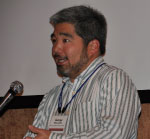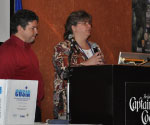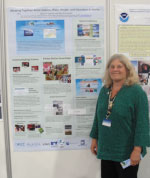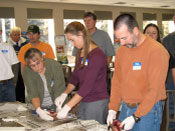COSEE Alaska, with a geographic emphasis on the U.S. Arctic and sub-Arctic coasts and a nationally significant thematic focus on ocean climate change, recently completed its second year as a partnership between the Alaska Ocean Observing System (AOOS), the Alaska SeaLife Center (ASLC), the University of Alaska Fairbanks School of Fisheries and Ocean Sciences (SFOS), the University of Alaska Fairbanks Center for Cross-Cultural Studies (CXCS), and the Alaska Sea Grant Program (ASG).
Now in our third year, we have sharpened our focus on catalytic, innovative and excellent programs and activities that engage and support ocean scientists in their broader impact activities, and that integrate Alaska Native knowledge and encourage participation of underserved, underrepresented audiences. Highlights are:
Traditional Knowledge – Ways of Knowing Ocean Climate Change in Alaska
Ocean Science Fairs: We expanded our Ocean Science Fairs to include cyberfairs and published a collection of Ocean Science Fair Activities and how-to videos. Science fairs were held in coastal Alaska communities, and more than 50 projects were judged at the statewide Science and Engineering Fair using two types of criteria (western science and cultural relevance/traditional knowledge), a significant increase over the number of projects judged in 2009. COSEE Alaska gave out $675 in 15 awards to 18 individual students and student team members. The first place high school project was by a student in Barrow with the project “How Will Global Warming Affect Stored Food in Ice Cellars?” The first place middle school award went to a project on corrosion of boat bottoms by a student in Unalaska,“Whatever Floats Your Boat”, and the first place elementary school award went to a student from Anchorage, “Rain Forest”. An Inspirational Teacher award was given for the first time, going to Raphia Maglanio from Mountain Village.
Publications & Resources: A new book entitled Alaska Native Education: Views from Within was co-edited by PI Dr. Ray Barnhardt and published with supplemental funds from NSF. PIs also developed a COSEE Science Fairs handbook, available on the Alaska Native Knowledge Network, and how-to videos.
Engaging Ocean Scientists Through Broader Impacts
| |  |
| Dr. George Matsumoto at Communicating Ocean Science Workshop |
Communicating Ocean Science Workshop: In January 2010, we hosted another successful workshop featuring COSEE National Advisory Council member Dr. George Matsumoto, COSEE California PI Craig Strang, and COSEE Ocean Systems PI Annette deCharon, among other speakers. Approximately 120 scientists, students, and informal science practitioners gathered to hear about efforts to bring ocean science understanding to the public. Evaluation findings from the event show that COSEE Alaska effectively identifies areas of interest and need for the audience and provides programming that is useful and likely to be used - 81% rate having educators and scientists collaborate in this manner as having “Vast” value (the highest rating option possible).
Alaska Marine Science Symposium: COSEE Alaska hosted outreach luncheon speakers for nearly 800 scientists at the 2010 Alaska Marine Science Symposium. The first luncheon featured National Ocean Science Bowl competitions between local high school students and teams of academic and NOAA scientists. Other speakers included Dr. Larry Mayer, who gave a popular talk about mapping the Arctic seafloor. Mike Beck from The Nature Conservancy discussed marine protected areas and coastal and marine spatial planning, and Charlotte Vick from Deep Search Foundation encouraged scientists to share their research on the new Google Ocean platform.
 | |
Participants in the Communicating Ocean Science Workshop | |
Ocean Acidification Workshop: At the Symposium, COSEE Alaska also coordinated the education and outreach strand of an Ocean Acidification Workshop and led a break-out discussion with scientists, journalists and educators.
Google Ocean Workshop: Scientists and educators filled a hands-on Google Ocean workshop following the Alaska Marine Science Symposium.
Faculty Seminar: To reach more researchers, we gave a university-wide seminar at UAF as well as advised scientists on their broader impacts proposals.
SEANET: We grew SEANET, an informal network of scientists, educators, journalists and community members; elected a Steering Committee; and launched an Ocean SEANET networking Ning site as well as a listserv. This core group includes representatives of more than 80 organizations and agency units, including the major marine research institutions in Alaska as well as a number of universities and consultants outside of Alaska (including several in Russia and Canada) who conduct research within the region; state and federal agencies that employ both researchers and education/outreach specialists; Alaska Native organizations and communities involved in natural resource management; and non-profit organizations that provide informal marine education to Alaska communities, schools, and visitors.
| |  |
| Marine Educator Marilyn Sigman with poster |
COSIA: We set the groundwork for bringing COSEE California’s COSIA course to Alaska in the spring of 2011, preceded by a training workshop in the fall of 2010, with a distance learning and traditional knowledge element.
Multimedia
- Podcasts: We collaborated with COSEE NOW on two podcasts featuring ocean scientists in the field, and developed lesson plans for the Prince William Sound Field Experiment on the 20th anniversary of the Exxon Valdez Oil Spill.
- Videos: We also developed three short Faces of Climate Change videos featuring Alaska Natives and western scientists - Climate Change in Alaska’s Seas, Disappearing Sea Ice, and Life on the Ice.
Poster Presentations: We presented a poster highlighting our work in the areas of communicating science, Alaska Native knowledge, and science literacy at the International Polar Year Science Conference in Oslo, Norway, and the AAAS Arctic Division Conference in Anchorage.
Resources for Educators
Virtual Field Trips: Midyear we began development of a virtual field trip development in Barrow, Alaska, which will include lessons regarding the landscape, animals and peoples of the Arctic.
Professional Development: We participated in teacher professional development workshops with partners and shared Ocean Science Fairs “best practices” at the Alaska Math and Science Teachers Association.
| |  |
| Salmon in the Classroom Workshop |
- The Salmon in the Classroom Workshop combined practical training in salmon classroom incubation and rearing projects with opportunities to interact with researchers on salmon ecology and potential effects of climate change. The participating teachers were from 20 rural Alaskan communities and all but three taught in classrooms where the majority of students were Alaska Native.
- The Alaska Sea Life Center, a COSEE Alaska partner, worked with their partner, the Oceans Alaska Science and Learning Center, to engage scientists in their annual teacher workshop for Kenai Peninsula School District teachers This year’s theme was “Go with the Flow: water from ice to ocean” and had more than 20 grade 3-5 teachers participate.
- Bering Sea Ecosystem Professional Development for Scientists and Educators brought together 28 scientists and educators, some onsite and some virtual, to create a body of educational resources focused on impacts of a changing climate on the Bering Sea ecosystem. COSEE Alaska joined forces with the North Pacific Research Board, the Arctic Research Consortium of the U.S., National Science Foundation, the Monterey Bay Aquarium Research Institute (MBARI) and NOAA to create the “Bering Sea Collection” of educational resources that will debut in January. Dr. George Matsumoto of the COSEE NAC and MBARI facilitated the workshop.
Ocean Literacy Awards
Alaska Ocean Leadership Award: We awarded an Alaska Ocean Leadership in Ocean Literacy Award during the Alaska SeaLife Center’s Ocean Gala on the eve of the Alaska Marine Science Symposium to Kenai Fjords Tours Marine Science Explorer Program. As part of CIRI Alaska Tourism, Kenai Fjords Tours has provided unique vessel-based programs for over 36,000 students and teachers since 1995.
Visit COSEE Alaska!

